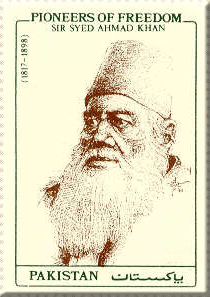 |
|||
 |
|||
 |
|||||||||||
 |
|||||||||||
|
Sir Syed Ahmad Khan, one of the greatest Muslim educationists, writers and reformers, was born at Delhi in 1817. He hailed from a well to-do landed aristocracy of Delhi. Syed Ahmad had no formal education in any educational institutions. He was rather a self taught person and became, through self study, one of the most well read men of his days. Sir Syed was born at a time when the continued existence of Muslims in the Sub-continent as a separate entity was in serious jeopardy. For nearly half a century he struggled against the apathy and dispondency that had settled upon the Muslims in the wake of their defeat in the War of Independence of 1857. He finally took them out of the abyss, gave them a national identity , enthused them with hope, brought clarity to their perception and thought and put them on the road to progress and freedom. In 1875 he founded the Muhammadan Anglo Oriental College at Aligarh aimed at creating a confluence of traditional learning and modem sciences. It was raised to the status of Muslim University in 1920. Sir Syed was nominated as Member Imperial Legislative Council in 1878 and renominated in 1881 but he resigned in 1883. He was a Member Education Commission in 1882 but resigned because of differences between him and the Chairman Dr -W- W- Hunter In 1886 he founded the "Muhammadan Education Congress', but later named it 'Conference' (to avoid confusion with the Indian National Congress), to carry the message of Aligarh to all parts of the country and remained its Secretary till 1897 . An ardent champion of a progressive and dynamic approach to education he was the first Muslim leader who perceived that the Muslims of India were a separate nation and must not be absorbed by Hindus in a United India. He made the prophetic declaration in 1867 "I am convinced that both the nations will not willingly cooperate in anything. Their mutual hostility will increase immensely in future. He who lives will see". He thus laid the first brick on which the edifice of Pakistan was raised. He is author of a number of famous essays and books namely' Aasaar- us-Sanadid', , Asbab-e-Baghawat-e-Hind', 'Loyal Muhammadans of India', 'Risala Tahqeeq-e-Lafze Nassara', 'Tabayyun-ul-Kalam', 'Strictures upon the present educational system in India', 'Series of Essays on the Life of Muhammad', 'Review on Hunter's Indian Musalmans', 'On the Present State of Indian Politics', 'Musalmanon Ki Kismat Ka Faisala', 'Sirat-e-Faridia'. Sir Syed had started working on a commentary on the Holy Quran. He wrote 7 volumes when he fell ill in 1898 and did not live long enough to complete it. He died in 1898 and buried at Aligarh.
|
|||||||||||
|
Author: Zia-ur-Rahman Zabeeh
Ex. Director General, Pakistan Post, Islamabad
Artist:
Professor Saeed Akhter
National College of Arts, Lahore
Webmaster: Zahid Ikram
CEO CYBER CITY ONLINE
Please Contact
Webmaster
for Comments/ Suggestions Sponsored By:
CCOLCopyrights © 2001, CYBER CITY
ONLINE.
|
|||||||||||
 SIR SYED AHMAD KHAN
SIR SYED AHMAD KHAN